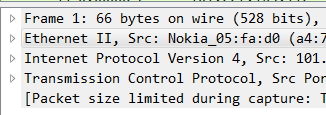参考http://blog.csdn.net/koudaidai/article/details/7673082
首先看下最常见的包的层次:frame层是不是实际传输的数据,是tcpdump添加的一层。eth层如果显示linuxcooked的话是没有指定网卡抓包的原因需要tcpdump -i 指定网卡。
可能会有其他协议层,自行添加即可。例如下图2


1、几个结构体

//pacp文件头结构体 struct pcap_file_header { bpf_u_int32 magic; /* 0xa1b2c3d4 */ u_short version_major; /* magjor Version 2 */ u_short version_minor; /* magjor Version 4 */ bpf_int32 thiszone; /* gmt to local correction */ bpf_u_int32 sigfigs; /* accuracy of timestamps */ bpf_u_int32 snaplen; /* max length saved portion of each pkt */ bpf_u_int32 linktype; /* data link type (LINKTYPE_*) */ }; //时间戳 struct time_val { int tv_sec; /* seconds 含义同 time_t 对象的值 */ int tv_usec; /* and microseconds */ }; //pcap数据包头结构体 struct pcap_pkthdr { struct time_val ts; /* time stamp */ bpf_u_int32 caplen; /* length of portion present */ bpf_u_int32 len; /* length this packet (off wire) */ }; //数据帧头 typedef struct FramHeader_t { //Pcap捕获的数据帧头 u_int8 DstMAC[6]; //目的MAC地址 u_int8 SrcMAC[6]; //源MAC地址 u_short FrameType; //帧类型 } FramHeader_t; //IP数据报头 typedef struct IPHeader_t { //IP数据报头 u_int8 Ver_HLen; //版本+报头长度 u_int8 TOS; //服务类型 u_int16 TotalLen; //总长度 u_int16 ID; //标识 u_int16 Flag_Segment; //标志+片偏移 u_int8 TTL; //生存周期 u_int8 Protocol; //协议类型 u_int16 Checksum; //头部校验和 u_int32 SrcIP; //源IP地址 u_int32 DstIP; //目的IP地址 } IPHeader_t; //TCP数据报头 typedef struct TCPHeader_t { //TCP数据报头 u_int16 SrcPort;//源端口 u_int16 DstPort;//目的端口 u_int32 SeqNO;//序号 u_int32 AckNO; //确认号 u_int8 HeaderLen; //数据报头的长度(4 bit) + 保留(4 bit) u_int8 Flags; //标识TCP不同的控制消息 u_int16 Window; //窗口大小 u_int16 Checksum; //校验和 u_int16 UrgentPointer; //紧急指针 }TCPHeader_t; //UDP数据 typedef struct UDPHeader_s { u_int16_t SrcPort; // 源端口号16bit u_int16_t DstPort; // 目的端口号16bit u_int16_t len; // 数据包长度16bit u_int16_t checkSum; // 校验和16bit }UDPHeader_t;
2、代码只是解析源ip 包大小以及时间输出到文件中,其他字段自行添加。简单的将就是read协议长度数据到对应协议结构体中输出即可。可以认为都是小端序的。

#include<stdio.h> #include<string.h> #include<stdlib.h> #include<netinet/in.h> #include<time.h> #include <unistd.h> #include <sys/stat.h> #define BUFSIZE 10240 #define STRSIZE 1024 typedef int32_t bpf_int32; typedef u_int32_t bpf_u_int32; typedef u_int16_t u_short; typedef u_int32_t u_int32; typedef u_int16_t u_int16; typedef u_int8_t u_int8; //pacp文件头结构体 struct pcap_file_header { bpf_u_int32 magic; /* 0xa1b2c3d4 */ u_short version_major; /* magjor Version 2 */ u_short version_minor; /* magjor Version 4 */ bpf_int32 thiszone; /* gmt to local correction */ bpf_u_int32 sigfigs; /* accuracy of timestamps */ bpf_u_int32 snaplen; /* max length saved portion of each pkt */ bpf_u_int32 linktype; /* data link type (LINKTYPE_*) */ }; //时间戳 struct time_val { int tv_sec; /* seconds 含义同 time_t 对象的值 */ int tv_usec; /* and microseconds */ }; //pcap数据包头结构体 struct pcap_pkthdr { struct time_val ts; /* time stamp */ bpf_u_int32 caplen; /* length of portion present */ bpf_u_int32 len; /* length this packet (off wire) */ }; //数据帧头 typedef struct FramHeader_t { //Pcap捕获的数据帧头 u_int8 DstMAC[6]; //目的MAC地址 u_int8 SrcMAC[6]; //源MAC地址 u_short FrameType; //帧类型 } FramHeader_t; //IP数据报头 typedef struct IPHeader_t { //IP数据报头 u_int8 Ver_HLen; //版本+报头长度 u_int8 TOS; //服务类型 u_int16 TotalLen; //总长度 u_int16 ID; //标识 u_int16 Flag_Segment; //标志+片偏移 u_int8 TTL; //生存周期 u_int8 Protocol; //协议类型 u_int16 Checksum; //头部校验和 u_int32 SrcIP; //源IP地址 u_int32 DstIP; //目的IP地址 } IPHeader_t; //TCP数据报头 typedef struct TCPHeader_t { //TCP数据报头 u_int16 SrcPort;//源端口 u_int16 DstPort;//目的端口 u_int32 SeqNO;//序号 u_int32 AckNO; //确认号 u_int8 HeaderLen; //数据报头的长度(4 bit) + 保留(4 bit) u_int8 Flags; //标识TCP不同的控制消息 u_int16 Window; //窗口大小 u_int16 Checksum; //校验和 u_int16 UrgentPointer; //紧急指针 }TCPHeader_t; //UDP数据 typedef struct UDPHeader_s { u_int16_t SrcPort; // 源端口号16bit u_int16_t DstPort; // 目的端口号16bit u_int16_t len; // 数据包长度16bit u_int16_t checkSum; // 校验和16bit }UDPHeader_t; // void match_http(FILE *fp, char *head_str, char *tail_str, char *buf, int total_len); //查找 http 信息函数 // int main(int argc, char ** argv) { struct pcap_file_header *file_header = NULL; struct pcap_pkthdr *ptk_header = NULL; FramHeader_t *eth_header = NULL; IPHeader_t *ip_header = NULL; TCPHeader_t *tcp_header = NULL; UDPHeader_t *udp_header = NULL; char output_name[100] = {}; FILE *fp, *output, *tmp = NULL; u_int64_t pkt_offset, i=0; int ip_len, http_len, ip_proto; int src_port, dst_port, tcp_flags; char buf[BUFSIZE], my_time[STRSIZE]; char src_ip[STRSIZE], dst_ip[STRSIZE]; char host[STRSIZE], uri[BUFSIZE]; int last_time = 0; //初始化 file_header = (struct pcap_file_header *)malloc(sizeof(struct pcap_file_header)); ptk_header = (struct pcap_pkthdr *)malloc(sizeof(struct pcap_pkthdr)); eth_header = (FramHeader_t *)malloc(sizeof(FramHeader_t)); ip_header = (IPHeader_t *)malloc(sizeof(IPHeader_t)); tcp_header = (TCPHeader_t *)malloc(sizeof(TCPHeader_t)); memset(buf, 0, sizeof(buf)); // if(argc != 2) { printf("./parse_cap file_name.cap "); return; } if((fp = fopen(argv[1],"r")) == NULL) { printf("error: can not open pcap file "); exit(0); } if(access("./cap_stat", F_OK) != 0) { printf("create new path "); if(mkdir("./cap_stat", S_IRWXU | S_IRWXG | S_IROTH | S_IXOTH) != 0) { printf("create path fail "); exit(0); } } //开始读数据包 pkt_offset = 24; //pcap文件头结构 24个字节 while(fseek(fp, pkt_offset, SEEK_SET) == 0) //遍历数据包 { i++; memset(ptk_header, 0, sizeof(struct pcap_pkthdr)); //pcap_pkt_header 16 byte if(fread(ptk_header, 16, 1, fp) != 1) //读pcap数据包头结构 { printf(" read end of pcap file "); break; } pkt_offset += 16 + ptk_header->caplen; //下一个数据包的偏移值 strftime(my_time, sizeof(my_time), "%Y-%m-%d %T", localtime((time_t *)&(ptk_header->ts.tv_sec))); //获取时间 double time = ((u_int64_t)ptk_header->ts.tv_sec * 1000000 + ptk_header->ts.tv_usec)/1000000.000; // printf("time = %.4f ,len = %d ", time, ptk_header->len); if(last_time == 0) { last_time = (int)time; memset(output_name, 0, 100); char *path = strrchr(argv[1], '/'); if(path == NULL) { sprintf(output_name, "./cap_stat/%s_%d", argv[1], (int)time); } else { sprintf(output_name, "./cap_stat/%s_%d", (path+1), (int)time); } // printf("output name = %s ",output_name); if((output = fopen(output_name,"w+")) == NULL) { printf("error: can not open output file "); exit(0); } } else if(last_time + 60 <= (int)time) { last_time = (int) time; memset(output_name, 0, 100); char *path = strrchr(argv[1], '/'); if(path == NULL) { sprintf(output_name, "./cap_stat/%s_%d", argv[1], (int)time); } else { sprintf(output_name, "./cap_stat/%s_%d", (path+1), (int)time); } // printf("output name = %s ",output_name); if((tmp = fopen(output_name, "w+")) == NULL) { printf("error: can not open new output file "); } else { fclose(output); output = tmp; tmp = NULL; } } memset(eth_header , 0, 14); //数据帧头 14字为ethnet协议大小,注意指定网卡抓包 不指定是16字节的linuxcooked if(fread(eth_header, 14, 1, fp) != 1) //读Ethernet数据 { printf(" read end of pcap file "); break; } if(eth_header->FrameType != 0x0008) { // printf("Ethernet type = %x ", eth_header->FrameType); if(eth_header->FrameType == 0x0081) { fseek(fp, 4, SEEK_CUR); //忽略802.1Q } else { printf("unknown frame type%x ",eth_header->FrameType); continue; } } //fseek(fp, 14, SEEK_CUR); //忽略数据帧头 //IP数据报头 20字节 不考虑>20字节 memset(ip_header, 0, sizeof(IPHeader_t)); if(fread(ip_header, sizeof(IPHeader_t), 1, fp) != 1) { printf("%d: can not read ip_header ", i); break; } inet_ntop(AF_INET, (void *)&(ip_header->SrcIP), src_ip, 16); inet_ntop(AF_INET, (void *)&(ip_header->DstIP), dst_ip, 16); ip_proto = ip_header->Protocol; ip_len = ip_header->TotalLen; //IP数据报总长度 // printf("%d:src=%s ", i, src_ip); memset(buf, 0 ,BUFSIZE); sprintf(buf, "%.4f,%s,%d ",time, src_ip, ptk_header->len);// dst_ip, if(fwrite(buf, strlen(buf), 1, output) != 1) { printf("output file can not write %d ", i); continue; } /* if(ip_proto == 0x06) //判断是否是 TCP 协议 { //TCP头 20字节 if(fread(tcp_header, sizeof(TCPHeader_t), 1, fp) != 1) { printf("%d: can not read tcp_header ", i); break; } src_port = ntohs(tcp_header->SrcPort); dst_port = ntohs(tcp_header->DstPort); tcp_flags = tcp_header->Flags; // printf("%d: src=%x ", i, tcp_flags); if(tcp_flags == 0x18) // (PSH, ACK) 3路握手成功后 { if(dst_port == 80) // HTTP GET请求 { http_len = ip_len - 40; //http 报文长度 match_http(fp, "Host: ", " ", host, http_len); //查找 host 值 match_http(fp, "GET ", "HTTP", uri, http_len); //查找 uri 值 sprintf(buf, "%d: %s src=%s:%d dst=%s:%d %s%s ", i, my_time, src_ip, src_port, dst_ip, dst_port, host, uri); //printf("%s", buf); if(fwrite(buf, strlen(buf), 1, output) != 1) { printf("output file can not write"); break; } } } } else if(ip_proto == 0x11)//UDP { if(fread(udp_header, 8, 1, fp) != 1) { printf("%d: can not read udp_header ", i); } src_port = ntohs(udp_header->SrcPort); dst_port = ntohs(udp_header->DstPort); printf("udp src port = %d, dst port = %d ", src_port, dst_port); } */ } // end while fclose(fp); fclose(output); return 0; } //查找 HTTP 信息 void match_http(FILE *fp, char *head_str, char *tail_str, char *buf, int total_len) { int i; int http_offset; int head_len, tail_len, val_len; char head_tmp[STRSIZE], tail_tmp[STRSIZE]; //初始化 memset(head_tmp, 0, sizeof(head_tmp)); memset(tail_tmp, 0, sizeof(tail_tmp)); head_len = strlen(head_str); tail_len = strlen(tail_str); //查找 head_str http_offset = ftell(fp); //记录下HTTP报文初始文件偏移 while((head_tmp[0] = fgetc(fp)) != EOF) //逐个字节遍历 { if((ftell(fp) - http_offset) > total_len) //遍历完成 { sprintf(buf, "can not find %s ", head_str); exit(0); } if(head_tmp[0] == *head_str) //匹配到第一个字符 { for(i=1; i<head_len; i++) //匹配 head_str 的其他字符 { head_tmp[i]=fgetc(fp); if(head_tmp[i] != *(head_str+i)) break; } if(i == head_len) //匹配 head_str 成功,停止遍历 break; } } // printf("head_tmp=%s ", head_tmp); //查找 tail_str val_len = 0; while((tail_tmp[0] = fgetc(fp)) != EOF) //遍历 { if((ftell(fp) - http_offset) > total_len) //遍历完成 { sprintf(buf, "can not find %s ", tail_str); exit(0); } buf[val_len++] = tail_tmp[0]; //用buf 存储 value 直到查找到 tail_str if(tail_tmp[0] == *tail_str) //匹配到第一个字符 { for(i=1; i<tail_len; i++) //匹配 head_str 的其他字符 { tail_tmp[i]=fgetc(fp); if(tail_tmp[i] != *(tail_str+i)) break; } if(i == tail_len) //匹配 head_str 成功,停止遍历 { buf[val_len-1] = 0; //清除多余的一个字符 break; } } } // printf("val=%s ", buf); fseek(fp, http_offset, SEEK_SET); //将文件指针 回到初始偏移 }
3、编译 gcc parse_cap.c -o parse_cap
输入pcap名,输出文件:./cap_stat/pcap_时间(60S分文件),内容格式:时间、srcip、len

附加:python dpdk 解析部分字段 仅供参考:

#!/bin/python #-*-encoding = utf-8 -*- import time import dpkt import socket import datetime import os import sys def run_as_daemon(): try: pid = os.fork() if pid > 0: sys.exit(0) except OSError, e: print "fork fail %s" % e os.setsid() os.umask(0) def saveRecord(ts, src, len): global record_fd try: record_fd.write(str(('%.3f' % ts)) + ',' +str(src) + ',' + str(len + 18) + ' ') except Exception as e: print "write fail" def change_file(): global record_fd global file_name global cap_name try: fd = open("./cap_stat/%s_%d" %( cap_name,file_name), "a+") print fd os.exit(0) if record_fd != -1: record_fd.close() record_fd = fd except Exception as e: print "open file fail" + str(e) def printPcap(pcap): global file_name for (ts,buf) in pcap: count = 0 try: eth = dpkt.ethernet.Ethernet(buf) ip = eth.data try: src = socket.inet_ntoa(ip.src) dst = socket.inet_ntoa(ip.dst) except Exception as e: # print "Error:" + str(e) continue # if str(src) == "172.17.173.237": # print "%.3f,%s,%d" % ( ts,str(src),len(buf)) # saveRecord(ts,src,len(buf)) if file_name == -1: file_name = int(ts) change_file() elif file_name == int(ts): pass elif int(ts)%60 == 0 or int(ts) > file_name + 60: file_name = int(ts) change_file() count += 1 if count%1000 == 0: time.sleep(0.1) saveRecord(ts,src,ip.len) except Exception as e: print str(e) record_fd = -1 file_name = -1 cap_name = -1 def main(): global cap_name input_name = sys.argv[1] cap_name = str(os.path.basename(input_name)) print cap_name,type(cap_name) try: fd = open(input_name, "r") except Exception as e: print "open file fail" return pcap = dpkt.pcap.Reader(fd) printPcap(pcap) fd.close() record_fd.close() if __name__ == "__main__": run_as_daemon() main()
